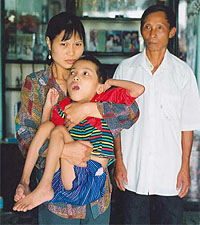Vietnamese victim and plaintiff to discuss historic Agent Orange case
Dr. Phan Thi Phi Phi, one of three Vietnamese plaintiffs in a lawsuit against American chemical manufacturers, and Susan Hammond, deputy director of the New York-based Fund for Reconciliation and Development, will discuss this historic case in a lecture titled “Agent Orange: A New Vietnam War” at 6:30 p.m. Thursday, March 3, in Chase Hall Lounge, 56 Campus Ave., Bates College.
The event, free and open to the public, is co-sponsored by Maine Campus Compact, an organization of college and university presidents committed to the civic purposes of higher education, the Bates College history department, and Women of Color at Bates.
During the Vietnam War, the United States used the chemical Agent Orange to kill trees that gave cover to the enemy and to cut food supply. Western experts believe that more than 40 million liters of the dioxin-containing Agent Orange were sprayed in Vietnam.
While Hanoi claims that as many as two million Vietnamese are thought to be suffering several health effects including cancers and immunodeficiency from Agent Orange, the U.S. federal government insists that there is no proof linking Agent Orange with any illnesses. These differences over the Agent Orange issue have been a source of contention between the two governments since they renewed diplomatic ties in 1995.
The Vietnam Association for Victims of Agent Orange filed a lawsuit at the U.S. Federal Court in Brooklyn, N.Y., on Jan. 30, 2004, against more than 30 U.S. chemical companies, seeking compensatory and punitive damages. The first hearing took place on Monday.
The New York Times has described the Agent Orange lawsuit as “an important test of the reach of American courts, drawing worldwide interest and setting off a fierce debate among international-law experts,” after the U.S. Justice Department urged the court to dismiss the suit.
Dr. Phi Phi, one of the Vietnamese plaintiffs, studied epidemiology at Hanoi University of Medicine, and has been investigating the link between rates of cancer and exposure to dioxin in Vietnam. Having served as director of Hospital No.1, a mobile facility in the heavily sprayed provinces of Quang Nam and Quang Ngai, Phi Phi believed that she was a victim of dioxin herself.
Susan Hammond has lived in Cambodia, Laos and Vietnam, working on projects that help build mutual understanding and respect between the United States and these three South East Asian nations. Hammond has coordinated projects that examine and address the effects of Agent Orange and unexploded ordinances. She is currently working with other organizations to develop an educational and fundraising campaign that aims to address the long-term health and ecological consequences of the use of Agent Orange, including a U.S.-wide traveling art exhibit starting in fall 2005.





